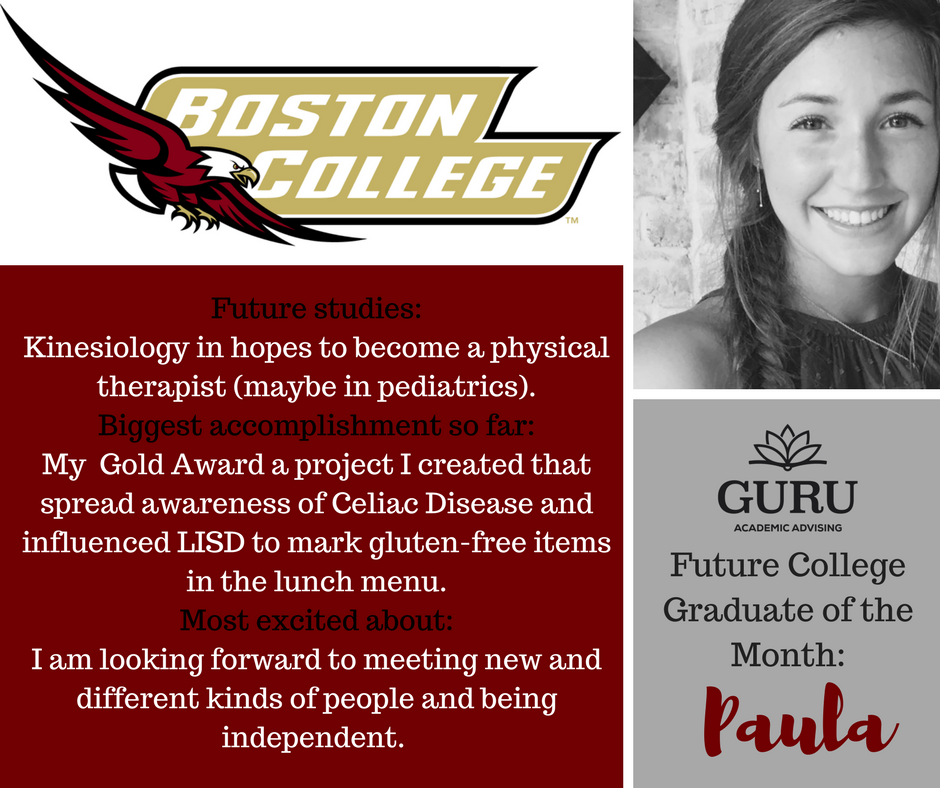|
0 Comments
With juniors, this is the time of year when we refine a cohesive and individualized application strategy. Part of that process involves brainstorming words that describe each student, applicable to many facets of their lives. I ask them to tell me:
We end up with a list of twenty or so words and character traits that relate to the student’s perception of themself as well as the way other people see them. In this exercise, common answers are “hardworking” or “passionate.” Here is the problem with these words: they have no direction. Lots of students are generally hardworking. In your college application, you are best served to identify the traits that you exemplify exceedingly. Are you exceptionally hardworking? More hardworking than any of your peers? And what makes you work so hard? What is your motivation? What are you working so hard for? Does your hard work have direction? This idea is especially true with passion. When students tell me they are “passionate”, I ask them “about what?” If they cannot answer, they need to give their thoughts more introspection. Passion without direction really isn’t passion at all. It’s the “for whats” of it all that make candidates for admission into unique individuals. Freshmen and sophomores: your job is one of discovery. Expose yourself to the world, dig into the problems that exist in your own community, do your own study into the subjects that interest you (learning for learning’s sake instead of the A-grade) to find an authentic source of motivation for your hard work and a direction to your passion. Don’t worry so much about tying this all together right now to your future job or even your major. Every college can only admit so many students who claim they are “passionate about the health professions.” Help yourself stand out with (real) passions that are unique to your experiences, motivations, and aspirations. But don’t expect those passions to just fall into your lap – get out there and undertake a diversity of experiences, outside your comfort zone, to start making sense of what matters to you in life. And parents, let them explore (I know it’s scary, but it helps them prepare to fly on their own). One terrific way to do that is through a low cost (or free!) residential summer program. For ideas, try this list. There’s a Facebook group out there for parents of students who are in college or transitioning to college. Parents use it as a space to vent, find common ground, and ask advice. Frequently, parents post with questions about college, and other parents write in with their recommendations, eager to help others navigate a process that’s so complex as to feel insurmountable.
Here are some examples of advice given by various posters in the past week: “AP tests and classes are tougher because school is trying to get them ready for the AP test in April. Freshman is pretty young to be taking AP. It doesn't matter how many APs she takes. Her un-weighted GPA matters more for college admission. She needs to keep her grades up.” ----- “Ivy's [sic] have the advantage of connections, as do some elite schools. Also to factor is if your child wants to attend medical school (very competitive) then a name and the connections are worth it!” ----- “Take both the SAT and ACT early and often. Scholarships and admissions are based on just the highest score on either test, and every point increase means an increase in scholarship money.” What do all these well-intentioned pieces of advice have in common? They are wrong. Following this advice could/would leave to worse outcomes for the student (and family paying the tuition bill). I want to use this post to give a strong caution in the crowd-sourcing of college admissions advice. For whatever reason, there is a lot of misinformation out there, but no lack of people who are happy (albeit well-intentioned) in giving it. Following that misinformation could be to the detriment of the student. So what is a family to do? And where exactly can you get smart answers? Here are some ideas:
I meet with many families during workshops, seminars, or in private consultation that report back information they heard elsewhere that is just flat out wrong. I don’t believe there should be a pay wall to getting smart information for college, which is why I find this so frustrating. If you ever have a question about college, whether you are a student on my “roster” or not, please send me an email. I am happy to answer questions. I started this business out of a passion for the power of higher education, and I believe all students deserve their best chance to get it. There are many sources of good information (high school counselors, admissions officers, college counselors), and what’s important is you find one. Resist the urge to crowd source, and empower your student to be a careful consumer and dedicated discoverer of his or her own information that will lead to the actualization of his or her own goals. Question: Who “wins” this game?
Player 1 was accepted into Harvard, his dream school. Player 2 was denied from every highly selective school to which she applied. She also applied to and was accepted by High Point University, her safety school in a sea of “lottery schools” from which she was denied. If we stop the game here, Player 1 is the clear winner. He has the acceptance to the prestigious university and the application plan that went according to plan. Player 2 is settling. She had an application plan that was not smartly put together, and she is dealing with the result. But guess what? The “game” doesn’t stop there. And that’s because life doesn’t stop there. There is more to it than just getting in. Once a student gets in, he or she has to attend, work hard, interact skillfully with professors and peers, apply for and win research opportunities, pass classes, get internships… What if we zoom forward three years from the scenario with which we started? What if we find out Player 2 is thriving? She is a “big fish in a smaller pond” about to do a semester in Florence with an internship for global marketing. She already has a job offer from her last internship in the summer, and she’s weighing that against the decision to continue on to graduate school. Possibilities abound. The failure she felt senior year being rejected from so many more prestigious colleges is just a blip in the past she doesn’t have time to dwell on. Meanwhile, Player 1 has, amid the incredible pressure of his immensely talented peers and the increased expectations of college life, dropped out. He’s taking time off while his mother encourages him to transfer into the local state university so he doesn’t fall further behind. He wasn’t a good fit for the pressure, and he had no idea it was going to be that way. He had applied and decided to attend his first college because of the name recognition. “If you get in to Harvard, you go”, his dad had told him. So he went, and he failed. It was never a good fit. Who is “winning” the game now? There’s a bigger idea here that’s so important for students and parents to remember. They must remember the end goal. What is this all for? What’s most important in this process? Is it bragging rights about how selective a school you could get into? It shouldn’t be. Your likelihood of success is not correlated with the lower the admissions percentage of the school you attend. Seniors, as you get your acceptances, think long term. Think realistically about your priorities. At Guru, we celebrate every success, not just the ones that come with single digit selectivity percentages, because we know we work hard to help families put together college lists that are based on substance—places our students will thrive academically, socially, and financially. And when Harvard says yes to the right kid, we celebrate that, too! The same way we do for Ole Miss, Syracuse, Stanford and everywhere in between. Below please find a copy of the email we've sent out to the parents of the seniors with whom we work:
By now, you have likely heard about the FAFSA, or Free Application for Federal Student Aid. The FAFSA will open on October 1st this year, so this is a one month heads up so you can be prepared and ready to file when it opens. I'm going to use this email as an explanation of what the FAFSA is, when to file it, what to have ready, etc. What it is: "FAFSA stands for Free Application for Federal Student Aid. This form is used to determine the amount of money a family is expected to contribute to the price of attending a postsecondary institution. The results of the FAFSA are used in determining student grants, work study, and loan amounts." Why it's important: Filing the FAFSA is important, regardless of whether or not you think you will qualify for financial aid. It's well worth your time to do so (plus it's easy, so no excuses). After you file the FAFSA, you will receive your formal financial aid offer. It's only then you will know how much your education is going to cost (this is a reason you should consider waiting to accept an admissions offer until after you receive the financial aid offer if finances are an important part of the equation). The FAFSA also serves as the paperwork necessary to qualify for federal loans (all students, regardless of income, qualify for some subsidized federal loans). The interest rate you will get is way better than the bank for these federal subsidized loans. What can I do right now? This year, there is no longer a PIN for the FAFSA; it has been replaced by what is called the FSA ID. The FSA ID is how you submit the FAFSA electronically. It serves as your certified digital signature. You can sign up for this now (and I recommend you do so). Both you and your student will need an FSA ID to complete the FAFSA. You can get that set up right now through this link: https://fsaid.ed.gov/npas/index.htm When can I file the FAFSA? Starting October 1st, you will be able to use that FSA ID to complete the FAFSA. October 1 is the earliest you can complete the form (this is a much earlier deadline -- it used to be January 1. Parents who have filed before, take note!). I recommend doing it as soon after October 1st as possible. You do not need to have filed this year's taxes to complete the FAFSA. Instead, you'll be using tax information from the most recently filed tax year (this is also a new change, called Prior-Prior-Year. You can read more about that here). The important thing is filing early. Where do I go to file the FAFSA? This is the link you can use to file the FAFSA starting in January: https://fafsa.ed.gov What do I need to have ready?
If you have any questions about how to file the FAFSA, there are numerous free resources out there. I am including here a super in depth guide put out by a company called Edvisors, which specializes in college financial aid consulting. It's a terrific guide. For nuanced or unique questions, I would consult the website finaid.org. One more thing to be aware of with financial aid forms is that there are several colleges, especially private colleges, that require additional forms like the CSS profile or a university specific financial aid form. To check to see if any of your colleges require the CSS Profile (in addition to the FAFSA), you can check this link: https://profileonline.collegeboard.org/prf/PXRemotePartInstitutionServlet/PXRemotePartInstitutionServlet.srv For every school to which you have applied, you should consult the school's financial aid webpage. Check the deadlines and requirements for each college. I hope your fall is off to a great start. I am thankful for so many things, and working with awesome students and families is one of the most important in my life. I truly love what I do and I am honored and thankful to you for allowing me the opportunity. Let me know if you have any questions! And feel free to forward this guide along to other families if they will benefit. Thanks! Erika Parents: you know this on a rational level. The day your child wakes up in his dorm room as a college freshman will not magically turn him into a responsible and self-sufficient adult. He won’t suddenly spring from him bed unprompted with his homework complete and go eat his Wheaties in the cafeteria. He has to learn to do that before he gets there. The person your child is at the end of high school is that same person that will start college. That means the habits they’ve cultivated, the skills they’ve learned, and the etiquette they employ (or fail to) are the tools they are equipped with to succeed in their new environment.
It’s your job as a parent to make sure they are ready, and in this case, doing more means doing less. As your child progresses through high school you need to do less in order to allow them to do more. This is called a graduated release of responsibility. It’s hard. It’s scary. It’s sometimes messy, but it’s necessary. Not sure where or how to start? In our work with students we’ve identified a subset of skills we believe all college-bound students need in order to succeed.
After just short of ten years, the Apply Texas prompts changed, all three of them. And that meant some new, interesting, and sort of funky prompts, the funkiest of which is the new Topic C. Topic C looks like this: “You've got a ticket in your hand - Where will you go? What will you do? What will happen when you get there?” And many high schoolers reacted like this: Fear not, we have some ideas to get you started. To begin, brainstorm a list of stuff you need tickets for. Come up with at least FIFTEEN ideas. Why fifteen? Because we want you to move past the stuff everyone else is going to write about. Yes, you need a ticket for a plane to the Bahamas. I can only imagine how many vacation essays the UT Admissions Office is going to read this year… keep thinking.
And thinking…. And thinking. Are you at fifteen yet? Good. See if you can come up with three more (How does that saying go? If it doesn’t challenge you…?). :) Ok, so you have your list. Think about your most honest answer to the questions in the prompt. Where is it you would go? If, after brainstorming, it truly is the Bahamas, so be it. But beyond that answer is a why question -- why would you go there? What is it you would gain from the experience? How will your life be different after that experience? It's the depth inherent in your choice that's interesting (meaning what your choice says about who you are rather than where it is you will go). So, next to each answer for where you will go with your hypothetical ticket, write down a few words about why you would go there, and think about what your choice says about you. Then, here’s the trick, move the essay forward. That same big idea about why you would go there? Think about how that idea will influence your life in the future. Where else will that idea take you in the proverbial journey of life? This isn’t an essay about where you want to go, it’s an essay about who you are. |
About Us
We are a full-service academic advising and college planning team. We started up shop in 2013 because we are passionate about helping students pursue opportunities for elite higher education. Need help? Want to know more? (972) 755-9507 Archives
September 2019
Categories
All
|










 RSS Feed
RSS Feed
